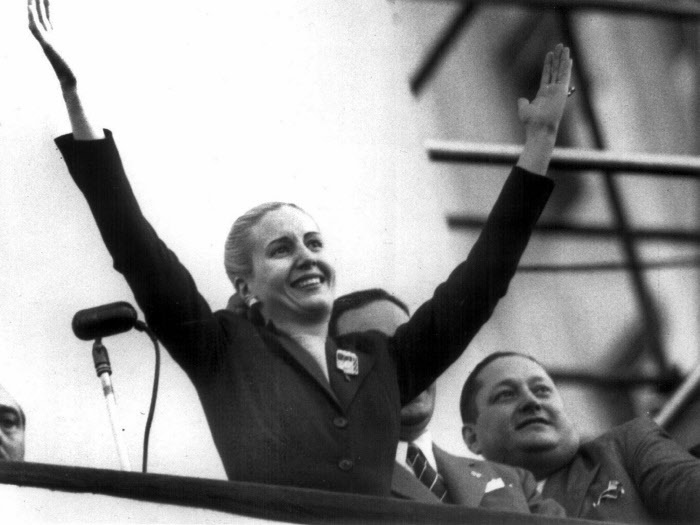Dates Centenary of the birth of Evita Perón: the 18 days in which Carmen Polo competed against her
This Wednesday, June 8, marks the
75th anniversary
of a historic event:
the visit to Spain
of what was already a living myth in Argentina,
Eva Duarte
,
Evita,
wife of President
Juan Domingo Perón
.
The natural daughter of
a rich landowner , her status as an
"adulterous"
offspring
reflected in her birth certificate marked her deeply and explains her
obsession with the underprivileged.
She achieved
renown as a
film, theater and radio actress until in 1944 she met
Juan Domingo Peron at the
age of 24 , a
widowed military man in his late fifties
who had been minister of war and served as
secretary of labor
for the government born of the 1943 revolution.
They were married in 1945, and a year later, Perón was elected
Argentine president
after an electoral campaign in which Evita actively participated,
something unprecedented
in the wife of a candidate.
Later, her figure grew to
play a starring role in politics,
becoming
an emblem of the
populist movement known as "Peronism" although her detractors criticized her
fondness for jewelry and ostentation.
Despite this, in the six years that she served as first lady, since
she died at only 33 years
of uterine cancer, she won the
adoration
of the popular classes, which she referred to as her
"shirtless"
, also becoming an
icon feminist,
by getting women's suffrage approved in her country.
Unheard of at that time was the
active participation of a woman
in politics, and even more so that she represented her country on
a state trip,
as she did the
18 days she toured Spain
from end to end as a prelude to her European tour, baptized as " Rainbow Tour".
The visit was a great oxygen balloon
for Franco,
because after the allied victory in World War II, his affinity with Hitler and Mussolini caused our country to be
isolated internationally,
and with the economy devastated by three years of civil war.
Only the populist Argentina of Perón, at that time a great power,
defied the United States and the British Empire,
sending an ambassador to Madrid and establishing an
economic agreement
with Franco, by which Argentina would send tons of
wheat, corn and food products
on credit. in exchange for metals such as
zinc, lead, mercury
and machinery for electric motors.
Evita's arrival at Barajas airport on June 8, 1947, at 8:30 p.m., was
tremendous
, because in addition to a crowd instructed by the regime, she was received
in person by Franco himself with his wife,
Carmen Polo, the government and the
highest hierarchies
of the army, the church and the phalanx.
October 1951 photo of Argentine First Lady Evita, waving to the crowd at an event in Buenos Aires. GTRES
Also memorable was the
ceremony
held the following day in the royal palace where the dictator imposed on her
the great cross of Isabel la Católica,
the highest decoration, then going out to the balcony where she was
cheered by thousands of people from Madrid,
since the regime had decreed a holiday for that they could come.
Apart from these tinsel, the reality is that
her visit to Spain was uncomfortable both for Franco and his supporters, who abhorred the leading role of a woman and also with
such leftist
ideas
, as for Evita herself, upon verifying the
lack of democracy, the degree of poverty
of the humble classes and the situation of political prisoners.
El Escorial, an asylum for the poor
At the lunch that was held in the royal palace after the event, there was
great tension
when Carmen Polo insisted that Evita visit Madrid de los Austrias, but she insisted on going
to the shantytowns.
She there she did not stop asking the men if they had work, she was interested in the sick children and
distributed money at large
proclaiming that she was not alms but "social justice".
On a subsequent visit to the monastery of El Escorial, surprised by the size of the monument and the number of empty rooms, she advised Franco
to turn it into an asylum
for orphans of the civil war, in the face of the dictator's suppressed anger.
Evita and General Franco, during Argentina's visit to Spain.EM
A
vindictive attitude
that he also exhibited during the rest of his tour of Spain, where he did not stop publicly referring to
thorny issues for his hosts.
"In Argentina we work
so that there are less rich and less poor,
do it too," she proclaimed, also denouncing the oppression of women and demanding the release of political prisoners.
He succeeded in the case of the communist militant
Juana Doña,
whose son had written a letter to the Argentine first lady begging her to intercede for his mother,
sentenced to death.
Evita managed to get Franco to commute his sentence before saying goodbye to Spain by visiting Barcelona, where he read a
letter from Perón to the Catalan workers
and took the plane to Italy at El Prat airport, to the cheers of some ten thousand people who came to fire her
Conforms to The Trust Project criteria
Know more
Francis Franco Bahamonde
Argentina

